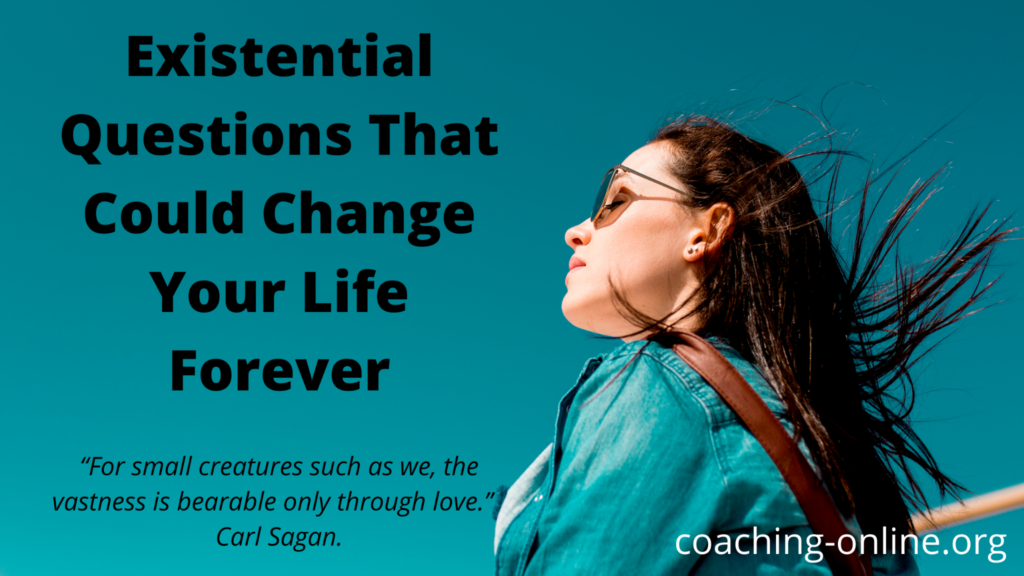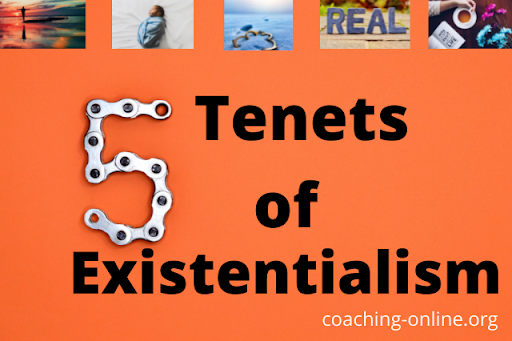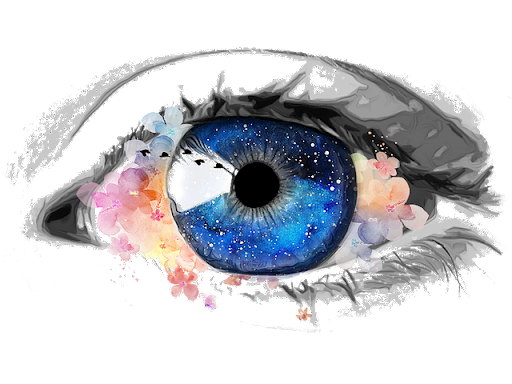It’s smart to contemplate the meaning of life, especially during an existential crisis. And what better way than to use existential questions?
We collected and carefully sorted life-changing existential questions to ask yourself, your friends, partner, or even strangers to create thought-provoking conversations that can change your life.
Let’s dive deep!

Key Takeaways
- Existential questions help you expand your understanding of existence.
- They can bring more meaning and fulfillment into your life.
- Once you begin to rack your brain, you´ll realize there are hundreds more existential questions that could be asked.
19 Existential Questions About the Meaning of Life
Life is much more than eating, sleeping, partying and other “mechanical” activities we do to care for our physical and emotional health. And often, we seek the “more” during an existential crisis where we face concerns regarding life’s meaning or lack thereof. This is very healthy.
Apart from discovering the meaning of life universally, you’ll get to learn how to live meaningfully and thus lead a fulfilling life depending on what you do with the following existential life meaning questions.
That’s enough talk, let’s get thinking…
- What is life?
- What is the difference between living and existing?
- Are we born with some character or do we develop all of it?
- Are our destinies predetermined?
- When did we start to exist?
- Would existence end?
- Why is there pain in life?

- What created the matter before the big bang?
- What is our purpose as humans?
- Should we pursue love, happiness, or meaning? Can we pursue all?
- Is it better to seek intelligence or wisdom?
- Is it worthwhile to avoid pain in life?
- Is suffering in life inevitable?
- What one thing would give life meaning?
- What does it mean to live a good life?
- Are meaning and fulfillment the same thing?
- Where does the soul exist?
- How did life start?
- How does existence exist in the first place?
16 Existential Questions About Love
Love is greatly known yet surprisingly misunderstood. And for this reason, you might be really curious to seek your own understanding of love.
Whether you want to ask your partner, friend, yourself, or God, questions about love are some of the eye-opening, thought-provoking questions in the history of mankind.
Some say unconditional/true love doesn’t exist. That it’s impossible. That even parents who are thought to love unconditionally, sometimes fail to do this and are selfish. And yet even the greatest philosophers of all time like Allain De Botton agree Jesus the Nazarene showed this kind of love. How did he do it?
Others claim love is a feeling and some that it’s a choice. Existentialism seems to agree on the latter. To find out insights about love, check out the following questions:
- What is the meaning of true love?
- Does true love exist?
- Is there one true love?
- What measures self-love?
- What makes self-love unselfish?
- Does love at first sight exist?
- Are there two specific people made for each other?
- Do soulmates exist?
- What makes up love?
- What makes us love others?
- How can I love without losing myself?
- Is it better to focus on loving than being loved?
- How many times can we fall in love?
- What makes people love each other?
- How can I love a person deeply even after knowing their weaknesses?
- How do we forget a person we once loved deeply?
Related: Best Questions To Ask Before Marriage
13 Existential Questions About Religion
Religion is a word having many definitions for many people but one thing is certain, it’s a set of practices surrounding spiritual beliefs. Some believe in God while others merely follow practices centered on certain supernatural connections.
Are we all meant to find one true religion? It gets us back to the most asked question of whether God exists. And if He doesn’t exist we start wondering where we came from again for the Big Bang theory might explain how the universe came to be but it doesn’t reveal where the matter creating the big bang came from.
I’m simply getting you to start thinking and sincerely hope you get to your personal truth to help you live life for the “Greater Good”. Not to mention, when seeking answers to these questions, you must choose to approach all theories with utmost humility to get the clarity you need.
- Is there an ultimate truth?
- What is the ultimate truth?
- Is truth subjective or objective?
- What truths should I live on?
- What is ethical/good and unethical/evil?
- Which are good morals and bad morals?
- Who decides what are morals?
- Is every religion truth?
- Which religion is the truth?
- Which is the religion of love?
- Why do humans believe in God?
- How can I know God is real?
- Can God speak to me when I ask Him to?
Related: 7 Best Life Purpose Coaches + Checklist
7 Funny Existential Questions

How about some laughter while thinking deep? Do you know laughter can relieve physical tension for as long as 45 minutes? It even improves the immune system through a stress hormone-antibody reaction. No wonder you hear around that laughter is the best medicine.
Now, this one is funny — laughter can also work out your abs. So some rib-cracking, ab-throbbing laughter in your workout routine could do you a lot of good. Check Gaiam to discover more health benefits of laughing to improve your overall wellbeing.
Jokes aside (pun intended), let’s get to lighten up with some funny existential questions:
- If plants can react to environmental conditions, can they perceive pain when we cut and eat them?
- If we should expect the unexpected, isn’t the unexpected expected anyway?
- If our thoughts are the reality, does anyone know reality really?
- One thing is funny to one person and unfunny to another, so what makes anything funny?
- Do animals feel love?
- Can you free the mind of thoughts without thinking of your blank mind?
- Can I watch my thoughts without thoughts watching me?
Related: BEST Questions For Married Couples
11 Scary Existential Questions
Scary times are some of the most life-changing moments. Think about it, when you’re changing jobs, scary. When you set out to build your own business, very scary. At any time, getting out of your comfort zone is scary.
Scary existential questions are similarly life-changing. They address what you’ve been avoiding and subsequently help you face your fears to attain positive change. Here, fear is your friend, not your enemy.
So without wasting time and yet carefully contemplating, check out the following questions:
- What happens if you die now?
- What if God actually exists?
- What if you’re wrong about everything?
- If you die three days from now, what would you do?
- What do you fear most?
- What are you avoiding?
- What are your goals and are you living up to them?
- What’s holding you back from doing one thing you’ve always wanted to do?
- If fear were to be stripped off you for a year, what would you do?
- If people’s opinions didn’t matter to you, how would you live?
- Who do you compare yourself to and why?
Related: Best Deep Yes or No Questions To Ask
14 Existential Questions About Death
“Losing your life is not the worst thing that can happen. The worst thing is to lose your reason for living.” – Jo Nesbo
Death is inevitable for every human. Truth is, this body will die someday and no matter the amount of effort that science has put into prolonging human life, at some point, not far in the future, we die.
Whether you’re wondering about the death of a loved one or your own, the following death existential questions can help put things into perspective and guide you to live your best life:
- What happens when we die?
- Why do we die?
- What will give me eternal life?
- Where will I go when I die?
- What is premature death?
- Is there life after death?
- If I were to die today, what would be my regret?
- What am I willing to die for?
- What do I need to learn from the death of a loved one?
- What would matter most when I’m on my deathbed?
- What is the healthiest way to think about death?
- How can I treasure life knowing that I’ll die someday?
- How would I like people to remember me?
- What do I want to accomplish most before I die?
12 Existential Questions to Ask Yourself About Your Life

It’s easy to live following the motions of life without truly knowing oneself and growing as an individual. Fortunately, existential questions to ask yourself can lead you to think about who you are, your purpose, dreams, relationships, and many other areas that matter to you.
Your life is yours to live and no matter how much I have experience as a coach, I can’t tell you exactly how to live it. Absolutely no other person can know how you ought to carry out every detail of your life.
That’s what existentialism is about. You are in a condition where you’re in a world with certain abilities and limitations and whatever value you can bring to your life and the lives of others, only you can dictate that and live it out. No one can do it for you no matter how they seem to guide or control your life.
That said, carefully go through these existential questions preferably with somewhere to jot down your precious meditations:
- How much do I really know myself?
- Am I living true to myself?
- What am I most thankful for in this life?
- What motivates me most?
- Am I living up to my goals?
- What’s the biggest lesson I’ve ever learned in life?
- Is doubting/underestimating my capabilities a good or a bad thing?
- What would I change about my past if I could?
- What is the life I want when I grow old?
- Where or who feels like home to me?
- How would my life change if the internet was no more?
- What would I do if I loved everyone unconditionally?
9 Existential Questions to Provoke Your Imagination
“Imagination is more important than knowledge. Knowledge is limited. Imagination encircles the world.” – Albert Einstein
The greatest shakers of the world had wild minds. Albert Einstein for example credited his successes to a passionately curious attitude. All the religious activists, science innovators, influential creatives, and even the greatest entrepreneurs in history used the power of imagination.
After all, how else can we know the world we don’t know that we ought to create?
So take your time and contemplate the following thought-provoking existential questions:
- Do you think there could be perfect world peace? Why and how?
- How would the world look like if it couldn’t produce electricity till further notice?
- Do aliens exist?
- If you believed in heaven, what would it look like to you?
- Why do we dream?
- What would you do to make yourself happy forever?
- What is in a blind man’s dreams?
- Can I travel to the future or past?
- What one thing would you change about the world if you could?
Related: BEST Mind-Boggling Questions
101 Miscellaneous Existential Questions
- Is reality objective or subjective?
- What is the purpose of art?
- Are we alone in the universe?
- What is the nature of consciousness?
- Is time real or an illusion?
- What is the meaning of beauty?
- How can we overcome our fears?
- What is the role of intuition in decision making?
- Can we trust our memories?
- What is the relationship between the mind and the brain?
- Is free will an illusion?
- What is the difference between right and wrong?
- How do we determine the value of human life?
- What is the role of suffering in human existence?
- How can we find inner peace in a chaotic world?
- What is the purpose of education?
- What is the meaning of success?
- Is there such a thing as fate?
- How can we overcome our biases?
- Can we truly know another person?
- What is the meaning of forgiveness?
- Is there an afterlife?
- What is the meaning of justice?
- What is the purpose of government?
- What is the role of empathy in human relationships?
- Is there a meaning to life beyond our individual existence?
- What is the nature of reality beyond the physical world?
- How can we find meaning in a world that seems meaningless?
- Is there a limit to human knowledge?
- What is the meaning of success and failure?
- Is happiness a choice or a result of external circumstances?
- How can we find purpose in our work?
- What is the nature of identity?
- How do we balance individuality and community?
- What is the nature of love?
- What is the role of language in human communication?
- Is there a universal morality?
- How can we find meaning in the face of death and suffering?
- What is the meaning of trust?
- What is the relationship between faith and reason?
- Is there a purpose to our dreams?
- What is the relationship between mind and body?
- How do we find meaning in a world that is constantly changing?
- What is the meaning of success and failure?
- How do we balance self-interest and altruism?
- What is the meaning of resilience?
- What is the nature of addiction?
- What is the meaning of courage?
- Is there such a thing as a meaningful coincidence?
- What is the role of beauty in our lives?
- What is the meaning of human creativity?
- How can we find meaning in the face of tragedy?
- What is the meaning of freedom?
- How do we balance tradition and innovation?
- What is the nature of truth?
- Is there a purpose to suffering?
- How can we find meaning in a world that is seemingly meaningless?
- What is the meaning of compassion?
- What is the nature of authority?
- Is there a meaning to our dreams?
- What is the meaning of community?
- How do we find meaning in our relationships?
- What is the role of ritual in the human race?
- Is there a meaning to human existence?
- How do we balance reason and emotion?
- What is the meaning of authenticity?
- What is the nature of identity in a globalized world?
- How can we find meaning in a world that is rapidly changing?
- What is the meaning of hope?
- What is the role of doubt in human existence?
- Is there a meaning to suffering?
- How do we balance individuality and conformity?
- Can we ever truly know ourselves or are we always changing?
- What is the role of art in human life?
- Can we ever really understand the nature of consciousness?
- Is free will an illusion?
- What is the nature of time?
- Why do we have emotions?
- Is the pursuit of knowledge always worthwhile?
- What is the purpose of beauty in our lives?
- What is the role of suffering in human experience?
- Is reality just a product of our perception?
- What is the meaning of freedom?
- Is it possible to be truly objective?
- Can we ever know the meaning of life?
- Is there such a thing as fate?
- How do we find meaning in a world that can seem so chaotic?
- Can we ever truly forgive someone who has wronged us?
- What is the role of faith in human life?
- Is there a universal morality or is it subjective?
- Is there such a thing as good or evil, or are they just social constructs?
- What is the nature of identity?
- What is the role of language in shaping our reality?
- Is there a purpose to suffering or is it just random?
- What happens to the consciousness after death?
- Is there a meaning to the universe beyond our human experience?
- Does absolute power corrupt absolutely?
- Can we ever truly understand the universe?
- Is it possible to achieve true objectivity?
- What is the meaning of consciousness?
- Can we ever fully understand the human mind?
What are the 5 tenets of existentialism?

Like every other philosophical paradigm, existentialism is based on core beliefs. While many boil them down to different aspects, you’ll find five main beliefs that describe existentialism. They include:
Existence precedes essence
Also referred to as freedom in existentialism, existence precedes essence was a phrase introduced by Jean-Paul Satre, a French philosopher of the 20th century. It means human beings exist first and build meaning as they go through life. Let me break this down further.
Existence precedes essence is a philosophical belief explaining that when we’re born, we’re born as nothing — with no meaning attached to us, no purpose, and thus, no definition. That we come into the world as a clean canvas ready to be painted with whatever we choose and act on in our environment.
“What is impossible is not to choose. I can always choose, but I must realize that if I decide not to choose, that still constitutes a choice” – Jean-Paul Satre
Some may claim that there are some things we can’t control. But Satre calls any limitation we’re born to “human condition.” He claims it’s still a choice to react to that limitation whether to choose to change it or not.
So if one says, I’m born short, with little hair, and no money to inherit, that would be your human condition/nature and therefore you can choose to react to such limitations by changing/improving/coping with them — or not. Ultimately, you always have a choice to make.
This is encouraging for anyone who feels they weren’t born with any ability they desire to have. The hope that they can do something to become who they desire to become. We see this hope as having born fruits in many who made it against all odds.
Subjectivity

Alternatively called phenomenology, subjectivity in existentialism means each individual experiences the world in their own unique perspective. Therefore, this marries the above theme in that, the way an individual chooses to experience anything builds up their existence to an essence.
Existentialism subjectivity contrasts scientific objectivity which explains a universal reality of viewing the world. In this case, you are what you are and your moral beliefs are what you choose them to be regardless of what society deems to be reality.
Sartre explains this well in his work Existentialism is a humanism saying,
“Man is indeed a project that has a subjective existence, rather unlike that of a patch of moss, a spreading fungus, or a cauliflower. Prior to that projection of the self, nothing exists, not even in divine intelligence, and man shall attain existence only when he is what he projects himself to be—not what he would like to be.”
Absurdity

Absurdity is what humans encounter when they enter the world. This tenet explains the frustration in the human tendency to find meaning and order in life and yet finding none or with partial certainty.
It works around the idea, we are all subject to the human condition, coming to this planet to live among others and eventually, dying in it. And yet how we live in the world, that’s up to us.
So it’s absurd when humans come into the world striving to attach meaning to things and find order in their choices but find none whatsoever. According to existentialism, there’s no meaning to life, just the essence you give it in subjectivity. Also, there’s no order so it’s absurd to try finding order as you make choices.
Anxiety

While existentialism’s freedom to choose and act may be exciting, the other side of the coin is dread for having made the wrong choices. And this manifests in anxiety.
If you’re an existentialist, you may think, “I wanted to become a great artist but my experiences which were born by my free will choices and actions have led me to a dead-end job in storekeeping. I’m responsible for the wrong outcome even when I was given the freedom to choose and act. This is unbearable!”
This stream of thoughts is also your choice and the next decision you make is a choice as well. This anguish or dread in the face of existentialism beliefs of existence over essence, subjectivity, and absurdity explain anxiety.
Existential anxiety tends to crop up during times of change or any daily challenges that challenge your physical, emotional, or spiritual stability.
Authenticity

With the freedom to choose and do whatever you want according to your unique perspective, existentialism promotes the attractive concept of authenticity.
Existentialism authenticity is where an individual’s choices and actions match their desires and values notwithstanding the pressures of the world to conform. It is based on acting on who you want to be, not just knowing.
This means that an existentialist must first come into terms with the concept of being present in an absurd planet of orderlessness and meaninglessness, free to choose and do what they desire according to the values they have in their unique perspective.
Authenticity is about taking full responsibility for your beliefs, choices, and actions. The opposite of this is known as bad faith in existentialism. It’s in existential themes, accepting the absurdity of the world, the subjectivity of one’s perspective, the anxiety of freedom, and choosing to live out the knowledge of self.
What Is a Good Existential Question?
A good existential question challenges the impossibility or possibility of things as mankind currently knows of. It seeks to know the underlying wisdom we have on life based on our unique perspectives. It may or may not be answered but it sure leaves a deeper awareness of our existence and essence.
What are the four main existential questions?
In an attempt to answer burning questions regarding our freedom to choose how we act in this world and the associated responsibility for our choices and actions, the meaning or meaninglessness of life and death, the solution to our anxiety, and concerns around authenticity, you’ll find four most asked existential questions.
They include:
- What is the meaning of life?
- Is there God?
- Are we living in free will or is it all an illusion?
- Is reality what we see or what is?
How to Ask Existential Questions
Existential questions are open to varied answers since everyone has their unique perspective. There is no right or wrong direction to take a conversation. While your answer may seem wrong to someone else and their answer may seem wrong to you, you have to keep an open mind and accept all answers as possible answers. This shows you’re humble and therefore, pose no social threat.
This doesn’t mean you lose a stand on whatever you believe. Keeping an open mind is about believing what seems like the best answer to you at a particular time in your own life, while tolerating and understanding other points of view.
This helps you during deep conversations since you won’t annoy others with aggressive arguments.
What’s Your Existential Question? Final Thoughts
If you carefully made it through the list, I’d expect two things, life-changing revelations about your life and more existential questions from you. We have more resources in this blog to help you with your burning philosophical questions.
And if you want to share with us your list of existential questions, feel free to do so in the comments below. We’d like to know your thoughts.
Even better, share this article with your friends if you like it — you’ll be changing lives. Thank you!
Related Posts
11 Success Traits Of A Lifestyle Entrepreneur
